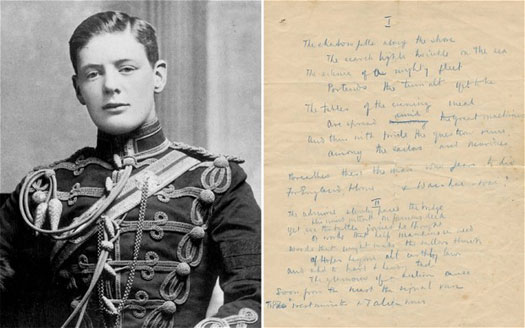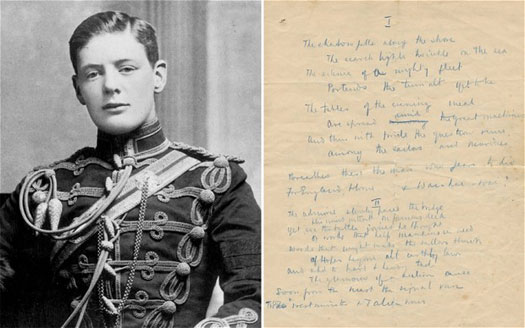
Bulletin #56 - Feb 2013
Appreciation: The Young Churchill Poem Hints at the Rhetorical Greatness to Come

January 1, 1970
The only known piece of poetry by a young Winston Churchill, written as he served with the British Army, carries echoes of Henry V. WSC in the uniform and the first page of the poem ©Getty
WSC in the uniform and the first page of the poem ©Getty
Editor’s Note: The Churchill Centre reserves commenting on this subject until the authenticity of the document has been verified to our satisfaction.
By Sameer Rahim
THE TELEGRAPH, 06 February 2013 — Ordinarily the appearance of previously little-known poem by a winner of the Nobel Prize for Literature would stir the interest of literary critics round the nation. The fact that this particular Nobel-winner is Winston Churchill – he was awarded the prize in 1953 for his History of the English-Speaking Peoples – would probably make the English profs take a back seat.

2024 International Churchill Conference
Churchill was a fine orator and had a way with English prose but it is generally acknowledged that he was given the Nobel literature prize as a reward for leading Britain during the Second World War – they couldn’t in all honesty give him the Peace Prize, could they?
But given the barrage of interest in Churchill – there are at least a dozen books published about him each year – there will be plenty of biographers poring over “Our Modern Watchwords”, a poem written in blue crayon on the notepaper of his regiment the 4th Hussars in 1898.
Written in regular iambic tetrameter but with irregular rhymes, the poem exists in a tradition that stretches back to Homer’s Iliad: the solider waiting impatiently for the battle to begin. As Churchill writes: “The silence of a mighty fleet / Portends the tumult yet to be.”
Allen Packwood, the director of the Churchill Archive Centre in Cambridge, compares the verse to Kipling, which is stretching it a bit. Kipling’s Barrack-Room Ballads published in the same decade were a superb imitation of the ordinary Tommy’s voice.
Churchill’s squib is more like the kind of the thing an officer writes to keep up morale: “And thus with pride the question runs / Among the sailors and marines / Breathes there the man who fears to die / For England, Home, & Wai-hai-wai.” (The last reference is to Chinese under British control.)
Two of the ten verses of Our Modern Watchwords
I
The shadow falls along the shore
The search lights twinkle on the sea
The silence of a mighty fleet
Portends the tumult yet to be.
The tables of the evening meal
Are spread amid the great machines
And thus with pride the question runs
Among the sailors and marines
Breathes there the man who fears to die
For England, Home, & Wai-hai-wai.
II
The Admiral slowly paced the bridge
His mind intent on famous deed
Yet ere the battle joined he thought
Of words that help mankind in need
Words that might make sailors think
Of Hopes beyond all earthly laws
And add to hard and heavy toil
the glamour of a victim(?) cause.
You can hear the slight echo of Shakespeare’s Henry V in the final line – something that crops up more clearly in Churchill’s famous war speeches. His use of the word “few” in a speech about the RAF’s efforts in 1940 – “Never in the field of human conflict was so much owed by so many to so few” – clearly references Henry V’s lines, “We few, we happy few”. So skilfully was the speech constructed, that it must have felt familiar on first hearing.
This was down to Churchill’s absorption of the whole range of literature from the Greeks to Shakespeare to the Bible. The poem written 42 years earlier is a small indication of the inspiring rhetoric to come.
Read the entire story at The Telegraph
©The Telegraph. All rights reserved.
Subscribe
WANT MORE?
Get the Churchill Bulletin delivered to your inbox once a month.


